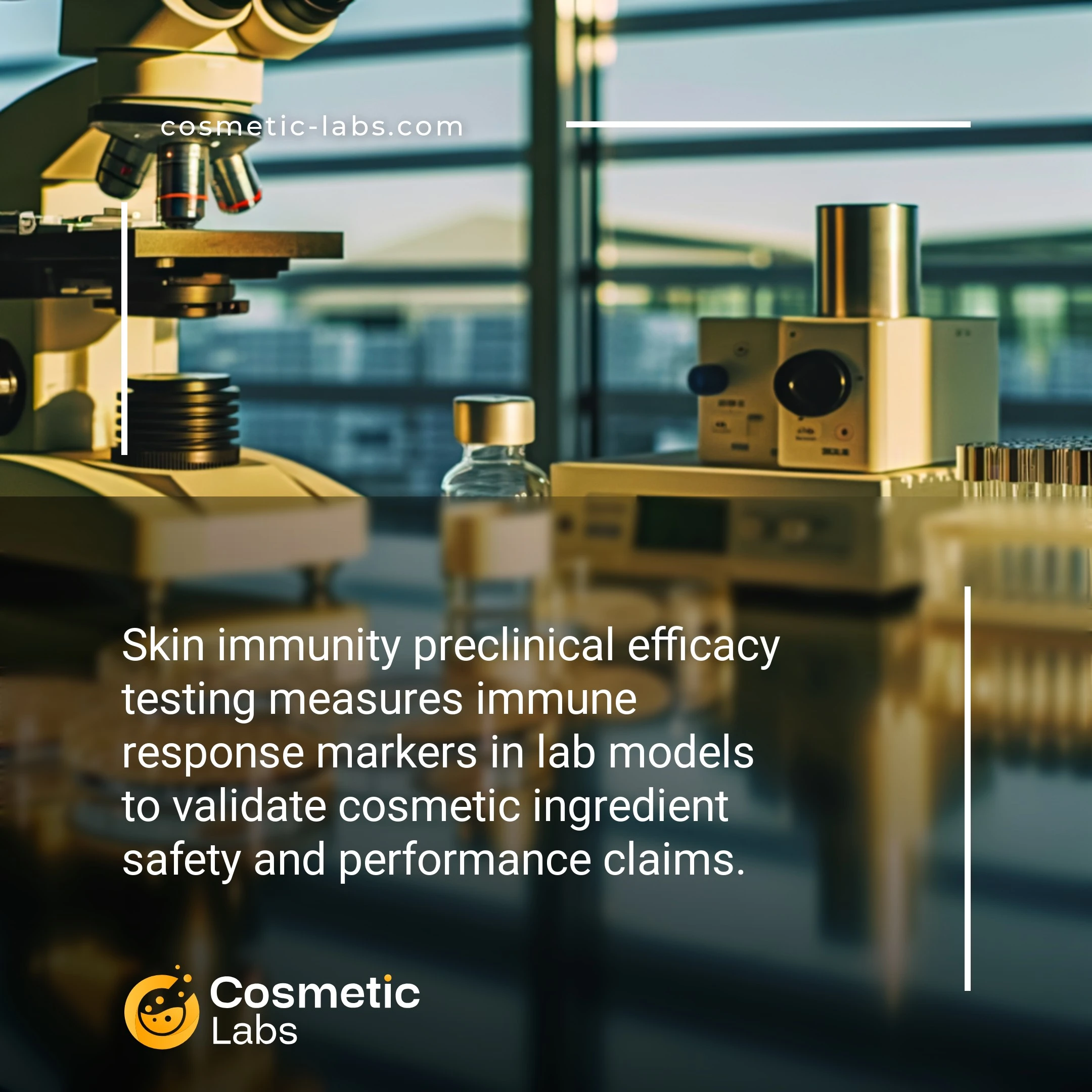Skin Immunity Testing Services for Cosmetic Brands

What is Skin immunity efficacy testing?
Skin immunity preclinical efficacy testing services evaluate how cosmetic ingredients and formulations interact with the skin’s natural defense mechanisms before human trials. Labs use in vitro cell cultures and biomarker analysis to measure anti-inflammatory responses, barrier function enhancement, and immune modulation effects. This testing reveals whether your product actually strengthens skin immunity or just claims to—data that’s becoming increasingly important as consumers demand proof behind immunity-boosting skincare promises.
Why do you need this service?
Cosmetic labs use skin immunity preclinical testing to validate anti-inflammatory claims for sensitive skin products and measure barrier protection efficacy in moisturizers before human trials. These immune response assessments help brands reduce clinical trial costs by 40-60% while building regulatory documentation for product launches targeting compromised skin conditions.
Who provides Skin immunity efficacy testing services?
All cosmetic labs providing Skin immunity efficacy testing services
There is no company providing these services at the moment.
Skin Immunity Preclinical Efficacy Testing Services
Skin immunity preclinical efficacy testing validates how cosmetic formulations interact with the skin’s natural defense mechanisms before human trials. Labs on our platform offer specialized immunological assays that measure your product’s impact on barrier function, inflammatory responses, and cellular immunity markers.
Barrier Function and Inflammatory Response Testing
Testing labs evaluate how formulations affect the skin’s protective barrier through transepidermal water loss measurements and cytokine profiling. These tests reveal whether your ingredients strengthen or compromise the skin’s natural defenses. Labs typically run inflammatory marker panels that track IL-1β, TNF-α, and other key mediators.
Common testing protocols include:
- Keratinocyte viability assays on reconstructed skin models
- Irritation potential screening using HET-CAM methodology
- Antioxidant capacity measurements through DPPH and ORAC testing
Cellular Immunity and Sensitization Assessment
Labs test your formulations against dendritic cell activation and T-cell proliferation to predict allergic reactions. The LLNA assay and its alternatives help identify potential sensitizers before costly human patch testing. These screenings save months in development timelines while reducing regulatory risks.
Testing typically covers:
- Langerhans cell activation through CD86 expression analysis
- Skin penetration studies using Franz diffusion cells
- Complement activation assays for immune compatibility
Connect with specialized labs on our platform to discuss your skin immunity testing requirements and accelerate your product’s path to market.
7 subcategories of Skin immunity efficacy testing services
There are no results matching your search
Practical Applications of Skin Immunity Preclinical Efficacy Testing
Cosmetic labs use skin immunity preclinical efficacy testing applications to validate product claims and demonstrate anti-inflammatory benefits before market launch.
Anti-Aging and Barrier Repair Product Development
Labs evaluate how formulations affect skin barrier function through transepidermal water loss measurements and cytokine analysis. Testing protocols measure inflammatory markers like IL-1β and TNF-α to quantify anti-inflammatory effects within 24-72 hours.
Brands developing retinol alternatives or peptide serums rely on these assays to demonstrate reduced irritation potential compared to traditional actives. Testing includes keratinocyte viability assays and immune cell activation studies using human skin models.
Sensitive Skin and Dermatitis-Targeted Formulations
Cosmetic labs test products designed for compromised skin barriers using reconstructed human epidermis models. These tests evaluate how ingredients modulate immune responses in sensitized skin conditions.
Labs measure specific biomarkers including TSLP, IL-33, and histamine release to validate calming and soothing claims. Testing protocols simulate atopic dermatitis conditions, allowing brands to substantiate therapeutic benefits for sensitive skin product lines.
| Test Method | Measured Parameters | Timeline | Application |
|---|---|---|---|
| Cytokine Release Assay | IL-1β, TNF-α, IL-6 | 24-48 hours | Anti-inflammatory validation |
| TEER Measurement | Barrier integrity | 4-7 days | Barrier repair claims |
| Histamine Release | Degranulation markers | 2-4 hours | Sensitivity testing |
| Immunofluorescence | Tight junction proteins | 3-5 days | Barrier function assessment |
Ready to validate your product’s skin immunity benefits? Contact specialized cosmetic labs on our platform to discuss your testing requirements and get detailed protocols for your specific formulation needs.

